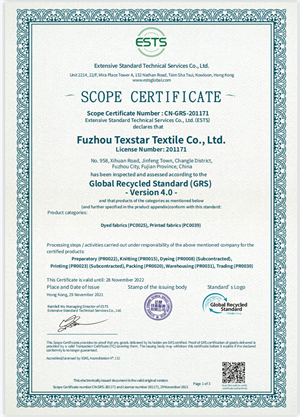Ecological production and social criteria are hardly taken for granted in the textile industry. But there are products that meet these criteria and receive a stamp of approval for them. The Global Recycled Standard (GRS) certifies products containing at least 20% recycled materials. Companies that label products with the GRS mark must comply with social and environmental guidelines. Social working conditions are monitored in accordance with UN and ILO conventions.
GRS gives socially and environmentally conscious companies a competitive advantage
The GRS is developed to meet the requirements of companies wishing to verify the content of recycled materials in their products (finished and intermediate), as well as responsible social, environmental and chemical production methods.
The goals of the GRS are to define requirements for reliable information about maintenance and good working conditions and to minimize harmful effects on the environment and chemicals. These include companies in ginning, spinning, weaving and knitting, dyeing and printing as well as sewing in more than 50 countries.
Although the GRS quality mark is owned by Textile Exchange, the range of products eligible for GRS certification is not limited to textiles. Any product containing recycled materials can be GRS certified if it meets the criteria.
Main factors for GRS certification include:
1, Reduce the harmful effects of production on people and the environment
2, Sustainable processed products
3, High percentage of recycled content in products
4, Responsible manufacturing
5, recycled materials
6, traceability
7, Transparent communication
8, Stakeholder participation
9, Compliance with CCS (Content Claim Standard)
GRS expressly prohibits:
1, Indentured, forced, bonded, prison or child labor
2, Harassment, discrimination and abuse of employees
3, Substances hazardous to human health or the environment (known as SVAC) or do not require the MRSL (Manufacturer’s Restricted Substance List)
GRS-certified companies must actively protect:
1, Freedom of association and collective bargaining (regarding trade unions)
2, The health and safety of their employees
Among other things, GRS-certified companies must:
1, Offer benefits and wages that meet or exceed the legal minimum.
2, Provision of working hours in accordance with national legislation
3, Have an EMS (Environmental Management System) and a CMS (Chemicals Management System) that meet the norms defined in the criteria
What is the standard for content claims?
CCS verifies the content and quantity of specific materials in the finished product. It includes the traceability of the material from its source to the final product and its certification by an accredited third party. This allows for transparent, consistent and comprehensive independent assessment and verification of the product specific material and includes processing, spinning, weaving, knitting, dyeing, printing and sewing.
CCS is used as a B2B tool to give businesses the confidence to sell and buy quality products. In the mean time, it serves as the basis for the development of ingredient declaration standards for specific raw materials.
Huasheng is GRS certified now!
As the parent company of Huasheng, Texstar has always strived to environmentally sustainable business practices, recognizing them not only as a trend but also as a definite future for the industry. Now our company has received another certification that confirms its environmental vision. Together with our loyal customers, we are committed to exposing harmful and unsustainable business practices by building a transparent and environmentally responsible supply chain.

Post time: Mar-30-2022